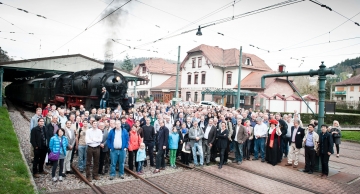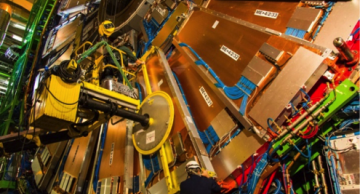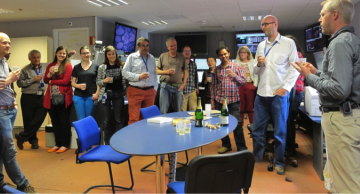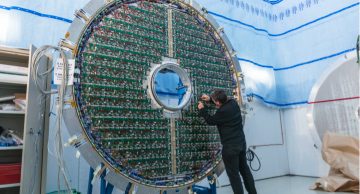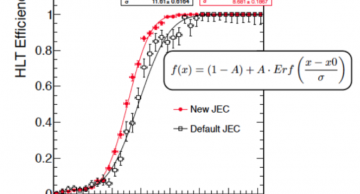The April Global Run (AGR), the first commissioning run in 2014, took place 7-11 April. After a couple of weeks of chewing on the data (and the Easter holidays), a “Data Analysis Jamboree” was held on 29 April (https://indico.cern.ch/event/315825…
News
|
malgeril |
Collaboration
Since the Easter break the activity in the Physics Coordination area has steadily increased on fronts.
The approaching of Summer Conferences is reflected in an increased rate of approvals.
The Heavy Ion group has started its analysis campaign for…
|
sphicas |
Collaboration
CMS news from the past two weeks:
The AGR (April Global Run)
Update from Physics Coordination (Apr 16)
Installation and commissioning of the ME4/2 Cathode Strip Chamber
Preshower ready for installation
En route to 2015: TSG workshop (Apr 7-9)…
|
jmans |
Collaboration
The first CMS Upgrade Week of 2014 was held at Karlsruhe in the first week of June [https://indico.cern.ch/event/294765/]. The goal of the week was to present the first draft of the Technical Proposal (TP) for the Phase 2 Upgrade of CMS. The TP,…
|
alanaro |
Collaboration
Since March this year new layers of Muon chambers have been added to CMS on both YE3 endcap disks. Two additional rings of 36+36 Cathode Strip Chambers (CSC), which complete the forward η coverage of muon station 4 (so-called ME4/2) in the region 1.…
|
rakness |
Collaboration
The April Global Run (AGR) took place last week, Monday-Friday 7-11 April. This being the first run since November 2013, the last run using the Run-1 DAQ, and the last run just before an extended cooling maintenance at P5, we embarked on the week…
|
malgeril |
Collaboration
We have had three important events on the “Higgs front” in the past few days:
⁃ Our H→ττ paper (HIG-13-004) is now accepted for publication by JHEP
⁃ The last of the “legacy” analyses, H→γγ, has now entered CWR and is heading towards publication, in…
|
barneyd |
Collaboration
As reported previously (ECAL Preshower removed from detector for repairs), both Preshower (ES) endcaps were removed temporarily from CMS and moved to the SX5 building at the end of 2013. This was due to four faulty “feedthroughs” (two per endcap)…
|
carlin |
Collaboration
The Trigger Studies Group (TSG) had its first workshop of 2014 in LAPP Annecy, on Mon-Wed Apr 7-9. TSG workshops are intense events, attended by around 40 people, where questions to the speakers during the talks are encouraged and unlimited, and 20…
|
sphicas |
Collaboration
CMS news from the past two weeks:
En route to 2015: update from physics coordination, 2014-04-04
Spring 2014 Offline/Computing Week
Completion of CSC innermost station refurbishment and testing
CMS news posted on the public Web site:
CMS…
|
malgeri |
Collaboration
After the wave of new and exciting results presented at the Winter conferences, the physics object and analysis groups are now focusing on the preparation of the CSA14 readiness test.
We have clustered the CSA14 “analysis” efforts around a few…
|
wulz |
Collaboration
From the desk of the CB Chairperson
The CB Chair team is pleased to issue the second newsletter of the year.
Draft minutes of the last CB meeting at CERN (28 Feb. 2014) are here.
Some highlights of the CB meeting during this CMS Upgrade Week in…

